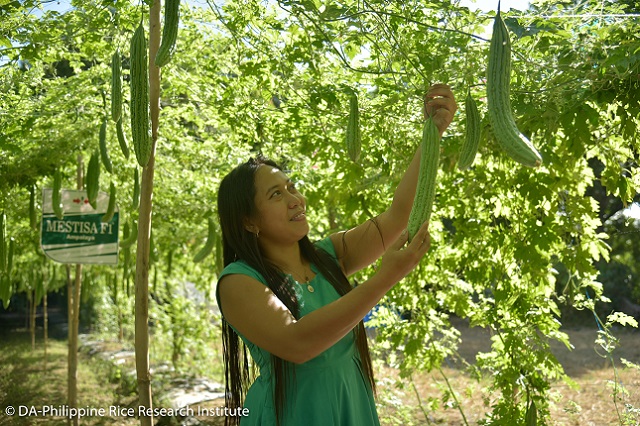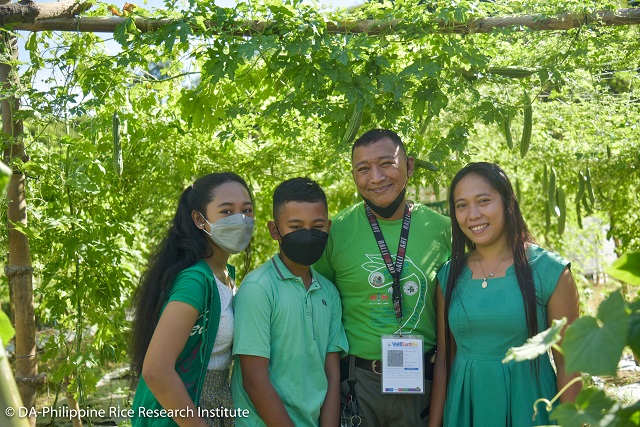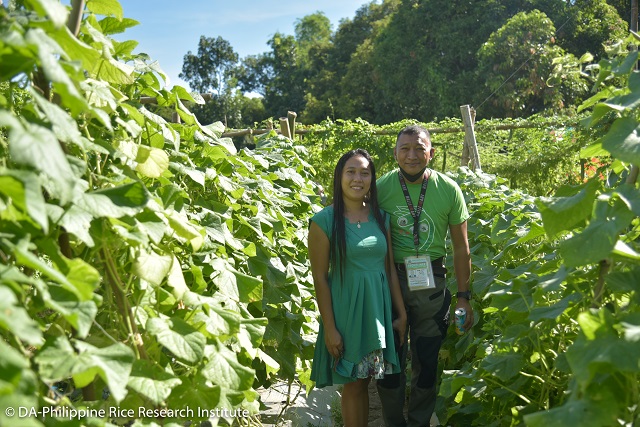
A short drive from the highway along San Antonio Weste in Lupao, Nueva Ecija is a field teeming with vegetables ready for harvest. Beside it is another field from which rice was freshly harvested. One would not think that these were barren seven months ago.
Aila G. Grospe, farm owner, recalls that the 1.3-ha farm has been abandoned for 15 years since her father passed away. The sudden twist of events brought about by the pandemic was the turning point for Aila and her husband Pierangelo B. Alejo. The business of licensed massage therapist Aila and her business consultant husband started to slow down and eventually stopped.
Remembering the deserted farm back home, Aila convinced her husband to try their hands on farming. With their two children, the family of four decided to leave Alabang, Muntinlupa, and start anew in Lupao.
“We are happy that we decided to come back because in farming, we found a lot of opportunities to better our lives,” Aila recounted.

Aila shared that when they visited her uncle’s farm, the couple was fascinated with farming. Seeing their enthusiasm, her uncle encouraged them to join the Lupao Vegetable Growers Association (LGVA), which they did.
“Joining LGVA made things a lot easier because we are provided the things that we needed to start,” she said.
The first crop that the couple tried was rice. “We got seeds from my uncle and tried to learn how to grow the crop,” she said.
Aila and Pierangelo then became farmer-cooperators of Sa Palay at Gulay – May Ani, Hanapbuhay, Oportunidad, at Nutrisyon (PAG-AHON-Phase II) project of the Department of Agriculture (DA), in collaboration with the local government of Lupao, LVGA, and East West Seed Company.
“We are thankful that through PAG-AHON, DA-Philippine Rice Research Institute taught us the PalayCheck System. We learned to use the right element in the right amount at the right time when applying fertilizers and pesticides,” she said.
Through the project, they were also able to acquire vegetable seeds from East West Seed and planted bitter gourd and cucumber in a 2,000m2 part of their farm.
“While growing the vegetables, we learned how to grow plants organically. The pests are challenging and fertilizer application is not easy but we are continuously learning,” she said.
Their efforts became fulfilling a few months after they started since their farm was GAP certified in December 2021. Now that their farm is certified, DA will also guide them in organic vegetable production.
Business in farming
“Joining PAG-AHON opened up many opportunities for us to do business in farming,” Aila said.
The couple’s ingenuity surfaced when they started harvesting their first produce. Aila made her own recipe of cucumber juice and pickles.

“Since we are planting chili pepper this season, we also thought of making dinagopa, my husband’s recipe of processed chili pepper with bagoong,” she said.
She shared her gratitude to the project, where they profited around P24,000 from their first produce. She related that it was especially easy for them to sell their cucumber and bitter gourd harvested from the 2,000m2 field, and this contributed largely to their income.
“We already have buyers waiting for our harvests. And since we are GAP certified, they buy our produce P5 higher for each kilogram,” the mom agripreneur said.
For Aila, deciding to revive her family’s farm is one of the most rewarding things she did in her life.
“I’m happy that in doing this, we have a source of income while we also have a source of safe and healthy food everyday,” she said with enthusiasm.




